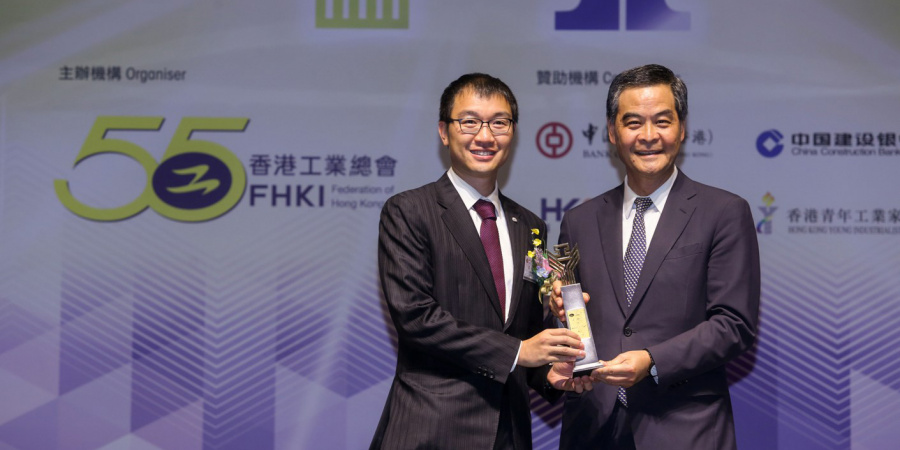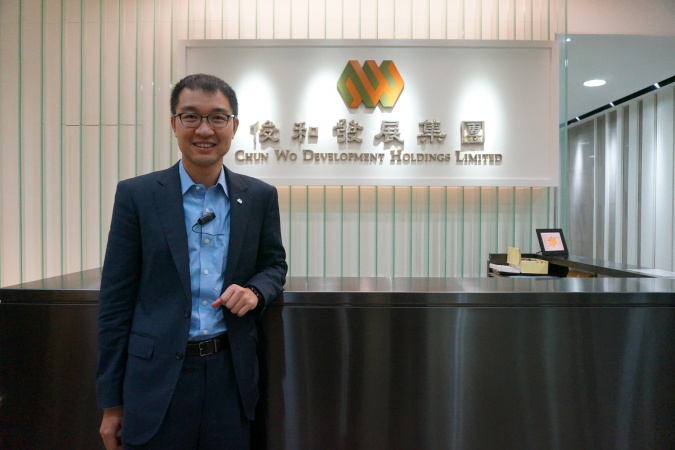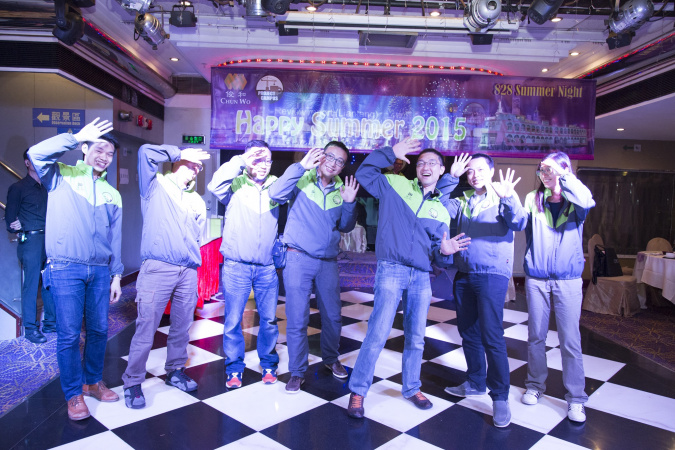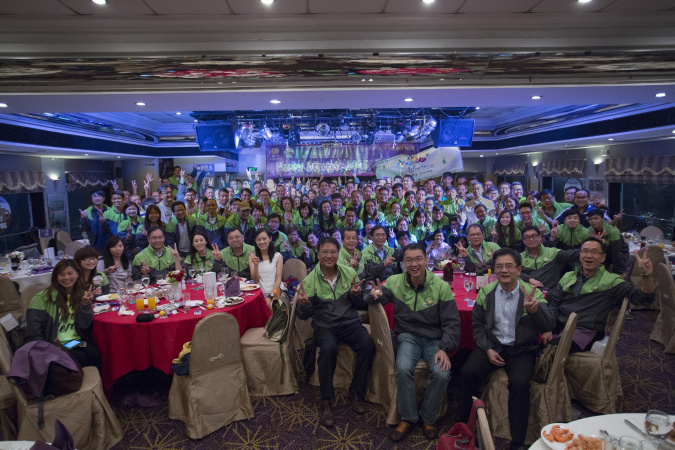Alumnus Ir Dr Derrick Pang Received Young Industrialist Award of Hong Kong 2015
2014 Civil Engineering PhD alumnus Ir Dr Derrick Pang was awarded the Young Industrialist Award of Hong Kong (YIAH) 2015 by the Federation of Hong Kong Industries for his contribution to the industry and society. Currently the Deputy Chairman of Chun Wo Development Holdings Limited, Dr Pang shares the valuable insight he gained from the PhD studies and his memorable experience in leading Chun Wo.
1. Why did you want to do a PhD program at HKUST? How did the thought of studying a PhD start?
Originally I didn’t think of or plan to study a PhD program! It was more a wish of my late father than my own. Back in the old days, my father didn’t have the chance to go to university or study a PhD program, so I guess he wanted me to fulfill his unrealized dream. With recommendation from a professor friend of my late father, my relationship with HKUST began as a PhD student in Civil Engineering.
2. How was your study experience in the PhD program? Was it more difficult or easier than you expected? Did you gain any insight from the experience?
There are not many things in my life that I feel proud of, but getting this PhD degree is one of them. It is not because of how big or small the achievement is, but because of the considerable effort I put into it. I faced a lot of struggles throughout the course of studies, and these experiences enabled me to learn much more about myself and to be a better person. For example, in the past, I did not understand the reasons behind my colleagues’ lack of effort in their duties. If people are not interested in their tasks, they will not be engaged. During the first few years of my PhD studies, I was merely going through the motion, and only once I got interested into the subject of my research, I can focus on my work. Therefore, at work, the answer is not to manage colleagues from procrastinating but how can tasks be structured to stimulate colleagues and establish engagement.
3. Did you encounter any difficulties during your PhD studies? How did you overcome and what did you learn from them?
I encountered quite a lot of difficulties during my PhD studies and there was a time when I nearly gave up. My father passed away around my fourth year of studies. At that time, I had to put aside my studies for two years to focus on looking after my company. I had finished collecting research data in my first two years, and I needed to start writing the thesis. My supervisor Prof Charles Ng also called me because of such delay. He encouraged me not to give up easily and shared his insights with me. At that time, my brother also told me that I should not give up easily. Taking both Prof Ng’s and my brother’s advice, I decided to grit my teeth and continue with the PhD program. There are times in life that we all need a little push and encouragement. That was the time.
Since then, I set a schedule for myself, I targeted to do my thesis daily so that I can catch up gradually. As I got into a routine, I found that things got more interesting. When I explored more and learnt more from my research project, my interest grew and I was more engaged in it. As time went by, I found that the final stage was not the most difficult because I got the gist of it.
The process of obtaining a PhD degree enabled me to understand myself better and know what I was made out of. I always think I am a tough person, but still cannot escape from the moment of giving up. Most importantly, I think having strong determination in reaching a goal can definitely be a driving force to make an achievement.
4. Why are you interested in your particular area of focus?
My focus is on geotechnical engineering. My master’s degree in MIT is also on geotechnical engineering. I am interested in it because it requires more interpretation and application of basic theories rather than following a code book.
5. What were your role and responsibilities when you first joined Chun Wo and how did they change over the years? How did the early-day experience help you as you later moved to the management level?
I joined Chun Wo in 2001. In the first three years, I was in construction sites where I learned to run projects from the operational perspective. Those three years are extremely important to me because even nowadays I draw on those experiences to solve problems that I face. My proactive attitude also created ample opportunities where I can learn. I would often be the one to roll up my sleeves and get myself into that particular job from time to time.
In those days I was quite strong headed with people, not receptive to others’ opinions and did not compromise. Such strong personality might fit if I am just to oversee projects, but not if I am to manage the whole company. After the initial three years I moved to the head office where my father had trained me to be a person with a broader perspective. He was very demanding of me and I didn’t understand why he treated me so harsh. But now as I looked back, my father was preparing me for the reality before I came to realize it. Whether you can succeed depends on hard work and the support from other stakeholders.
6. How is it like to lead a big company like Chun Wo? What major initiatives did you introduce and how successful are they?
After my father passed away, my brother and I continued to pursue transforming our company. Instead of focusing on system only, we also focused on the corporate culture. We introduced vision, mission and core values in our company four years ago. We have seven “C”s in our core values in which a key one is “Commitment” which means “We build trust through commitment”. I believe that is the building block in working in the construction industry. It is because people only trust you if you can fulfill your promise. The contracts we signed in the construction industry are multi-year contracts, and we are signing up for a long-term relationship. The biggest challenge is how to let our key stakeholders (not just our clients, but also suppliers and fellow colleagues) feel that we fulfill our promise when we finish the job. To achieve this, continuous communications and solving problems with our stakeholders together throughout the process would enable us to fulfill our promise. I think this core value has completely changed our corporate culture. I would say that the achievement of our company to date is a result of our colleagues’ trust in the company.
7. What is your most memorable experience in leading your company?
One memorable experience I would like to share is the tough times our company was facing during 2003-09. Due to the dramatic decrease of workload, by more than 50%, in the industry, our business has to downsize because we didn’t have enough projects. In order to keep our colleagues in the company, especially the long-serving ones, we had no choice but to reduce the salary. Even though the economy recovered afterwards, I kept thinking how I should prepare ourselves to handle similar crisis because those difficult times would come again. I would consider myself lucky to have dealt with the crisis in such an early time. That experience serves as a good reminder that there are solutions for even the most difficult problems, and we just work as a team to devise and execute.
This experience also made me think about the future during the boom times. The company needed a strategy to maintain its workload even during down times in Hong Kong. Our plan is to expand to overseas and into the real estate business with the help of strategic partners. We introduced a strategic shareholder China New Way to Chun Wo last year and reduced our shares to 10%. It injected capital to our company and gave us lots of opportunities for development. For example, we now have new projects in different places worldwide and we have diversified our business into overseas property development and management and also construction finance, aside from construction business. This major change gives our company higher stability and provides our colleagues with bigger room for development outside Hong Kong.
8. How did you help young engineers in your company develop their careers?
We launched the “Elite Training Program” 10 years ago to groom fresh graduates. The reason for setting up this is because I hope my colleagues have a wider perspective to understand the construction progress, from operations, commercial, safety, and other administration. Trainees under this 7-year program will rotate to different departments in the first three years. They would be placed in each department for three to six months and learn to make judgments from various roles. They should be able to understand the difficulties and problems faced by each position. I hope that in the future when they become managers, they could handle tasks from a wide perspective rather than focusing on their own job area.
After the three years in the initial stage, they would choose their most interested area for further development in the second stage. The special part about this program is that I would often spend time to meet the trainees so that they get to know more about me, and I also learn about their strengths and weaknesses. I hope that with my understanding of them, I could offer them useful advice when they encounter problems. I enjoy having developed trust between us through building up a strong working relationship.
9. Any advice will you give to engineering students in university who will start their engineering career soon? What are the essential qualities future engineers should possess?
Being innocent and having ideals are privileges of the young generation, but as we grow and experience difficulties and failures, our passions for such ideals often fade away. Many of us would not remember when exactly we started giving up; eventually we become indifferent to ideals that were once dear to us. While these experiences can be discouraging and sometimes painful, these mental scars define who we are and will be the guiding stars for our future encounters. Such maturity would also give us better perspectives of problems that our city and people are facing. Because we have become one of them. Do not shy away from these failures and difficulties, and by facing these difficulties day by day, we will persevere. Painful processes will become meaningful experiences. Actions stirred by emotions are short-lived, and only with perseverance can we achieve sustainable progress on the ideals that we once are so passionate about.




